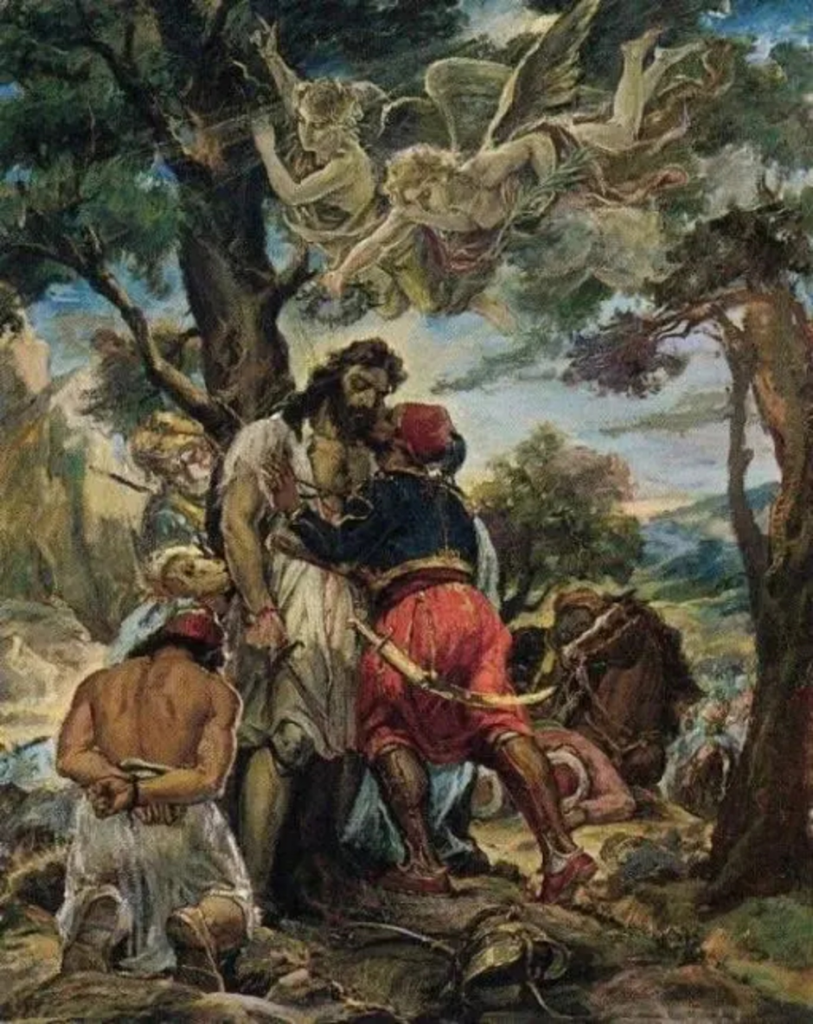Georgios Demetrios Flessas was a Greek patriot, priest, and government official who became known as a hero of the Greek War of Independence. He became known as Papaflessas as the word “papa,” meaning priest, was added before his last name “Flessas.”
Early life:
Papaflessas was born in 1788 in the village of Poliani in Messinia. He attended the renowned school of Dimitsana, where many Greek national heroes graduated.
In 1815, he was sent to become a priest and served in the monastery of Velanidia, situated outside of the city of Kalamata, Messinia. Papaflessas was known as “argumentative and defiant by nature” and was asked to leave the monastery of Velanidia after blessing a marriage between a man and his niece who was already engaged to someone else.
In April 1816, he moved to the monastery of Regkitsa and again came into conflict with his superiors as well as a Turkish official who thought Papaflessas was a revolutionary and was arming Greeks against the Turks, so sent soldiers to arrest and execute him.
After escaping, Papaflessas fled to Zakynthos where he met famous Greek general Theodoros Kolokotronis and then went to Constantinople.
There, in 1819, he was ordained to the highest priesthood position, Archimandrites, by Patriarch Gregorios V of Constantinople and he was given the ecclesiastical “officio of Dikaios” (the Ecumenical Patriarch’s representative), in order to be able to move freely and not to be bothered by the Turks. He also changed his name to Georgios Dikaios to not be identified by the Turks.
Papaflessas was sent to the northern part of the Ottoman Empire to inspire and spread hope among his countrymen for the nation’s independence from the Turks.

War of Independence:
The Greek War of Independence officially started on March 25, 1821, where the clergy had taken a leading part in the revolution.
In 1823, Papaflessas was named the Minister of Internal Affairs and the Chief of Police by the government of Prince Alexander Mavrocordatos, under the name Gregorios Dikaios.
He took part in many battles against the Turks and campaigned to suppress the rebels against the Greek government during the civil war in 1824.
When Ibrahim Pasha invaded the Peloponnese in 1825, Papaflessas ordered the government to release Theodoros Kolokotronis, who was jailed in Nafplion, to support him in a resistance against Ibrahim. When this demand was refused, Papaflessas told the government that he would go alone to Maniaki, Messinia, either to return victorious or die in battle.
Death:
Papaflessas went to Pylia, Messinia, with 3000 poorly armed men to face Ibrahim’s army of well-trained French officers, who had invaded the city of Pylos. Despite most of the Greek troops abandoning their positions and fleeing, Papaflessas continued to fight with a force of 800-1000 men.
Papaflessas was killed in battle on May 20, 1825.
It is reported that upon Papaflessas’ death, Ibrahim ordered his body be cleaned and tied to a tree before Ibrahim proceeded to kiss Papaflessas’ cheek as a sign of extreme respect.
It is said that Ibrahim told his officers: “If Greece had ten heroes like him, it would not have been possible for me to undertake the military campaign against the Peloponnese.”

